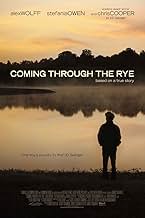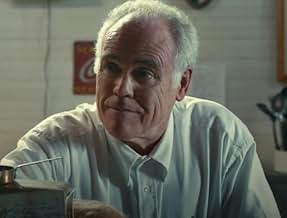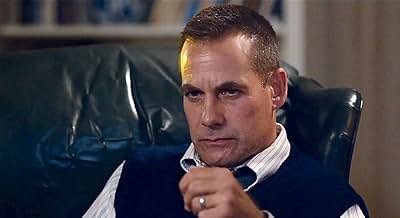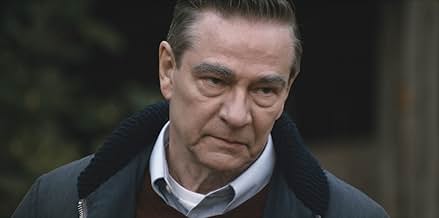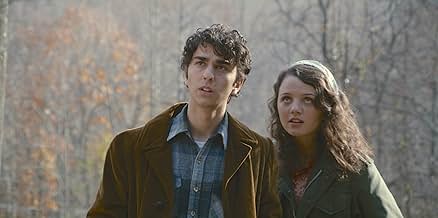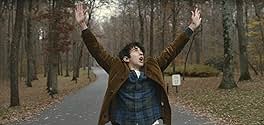IMDb-BEWERTUNG
6,3/10
1120
IHRE BEWERTUNG
Füge eine Handlung in deiner Sprache hinzuIn 1969, the Holden Caulfield-obsessed Jamie Schwartz runs away from boarding school to find the reclusive author J.D. Salinger. Inspired by actual events, Jamie's search is a journey into t... Alles lesenIn 1969, the Holden Caulfield-obsessed Jamie Schwartz runs away from boarding school to find the reclusive author J.D. Salinger. Inspired by actual events, Jamie's search is a journey into the meaning of friendship, love and loss.In 1969, the Holden Caulfield-obsessed Jamie Schwartz runs away from boarding school to find the reclusive author J.D. Salinger. Inspired by actual events, Jamie's search is a journey into the meaning of friendship, love and loss.
- Auszeichnungen
- 12 Gewinne & 3 Nominierungen insgesamt
Stefania LaVie Owen
- Deedee
- (as Stefania Owen)
Melissa Lozoff
- Dot
- (as Melissa Ann Lozoff)
Robert C. Treveiler
- Dan
- (as Rob Trevelier)
Empfohlene Bewertungen
Every "Catcher" reader will tell you that you don't need to relate to Holden, don't need to agree with Holden, hell, you don't even need to like him—to know how honest and raw he is with his reader. The reader knows more than Holden does at times, in spite of the walking contradiction that he is. J.D. Salinger wrote "The Catcher" out of desperation. He wrote it trying to hold on to parts of himself that he hadn't even fed in years. And this is apparent upon a first read, seeing that Holden's values are so rooted in who he is—but then not a page later they are replaced entirely. This film was not comprised out of that same desperation, it was composed of admiration, of love for the words that helped to inspire and not just numb. This is a glass and hard plastic reverence to what was once a leather-bound vow; finding your own story, making something of yourself, and searching out your spot to stand and hold the fabric of the world together. This film radiates the feeling of knowing who you ought to be, thinking that's all you could ever be, and then before the credits have rolled crumpling up all the words that used to define you. This film may not be everything that you will hope it to be at times, but it certainly won't all be what you expect. And if that were it's only connection to The Catcher in the Rye, that would be enough to earn the title. But it also develops real characters, and real heartbreak, real headway, and real authentic cinematography. By the end of the film, you thank the director and his fearless cast for leaving the camera rolling long enough to make you itch. If you can manage your own discomfort in those raw moments, you will appreciate how they opted away from "seamless." If only to make a jagged representation of what will always be an honest story, with honest feeling—not written for one person—but for generations to know that they weren't the first to love or hate Holden Caulfield...or Jamie Schwartz for that matter. And they won't be the last.
This is a winner. Believable acting, tight script, fine camera work. I've not read the book... This film makes me want to. Best parts were when Jamie speaks directly to us, and when he spoke directly to me. Reminded me of things I've not even now have had sorted out concerning my own high school experience.
Spoiler alert! This movie was so exciting for me to watch. I am a longtime fan of JD Salinger and the only one in my high school English class who didn't write Holden Caulfield off as crazy. I have read other stories of journalists going on treks to locate the reclusive Salinger only to make it as far as his driveway or front door to be turned away. When the filmmaker said 99% of the dialogue between himself and Salinger was true, I couldn't believe a KID had made it through the fortress! I loved the parallels between the young director's life and Holden's portrayed in the movie. He plays Mercutio in a prep school play and the students cheer his death. "But everyone loves Mercutio" he bemoans. You may remember Mercutio was Holden's favorite character in Romeo and Juliet. The alienation he feels from the other kids also parallels Holden's feelings of isolation. I loved the addition of Dee Dee a freckled curly haired cute and wonderfully insightful and kind girl who has an obvious crush on Jamie, the young director. She has her own strong feelings about the book Catcher In The Rye, pointing out that Holden always wanted to save kids from making mistakes and dangerous fates. Perhaps that is even why in reality the famous writer met the young playwright head on and even though he discouraged his play of Catcher in the Rye did encourage his creative endeavors generally.
I admit to being thrown off by the rave reviews here, because I found this movie utterly dull and not at all moving or evocative. To the degree it may have touched on the coming-of-age experience, it did so because of cliche scenes and plot lines recycled from every movie you have seen about young people. The writing suffers from the fault of telling rather than showing; we hear all about Jamie's masterful writing and intelligence, yet see none of it for ourselves.
There is no clever, insightful, or witty dialogue, and viewers never truly see Jamie's personality because it is overwhelmed by his obsession with and kowtowing to Salinger in a way that is uncomfortable to the viewer. I couldn't connect or sympathize with the character, a problem compounded by actor Alex Wolff's performance falling flat. Lackluster music intensified the lethargy.
The central problem, I think, is the film's autobiographical conceit. The story here could be interesting if executed with panache: aspiring and troubled boy seeks out reclusive author, receives golden wisdom. But the film's relentless desire to project Jamie as a hero refuses the more interesting (and believable) denouement, a glorious letdown as a teenager comes to realizes his skills are no match for J.D. Salinger and he is not ready for the real world. Instead the film takes Jamie's skills for granted, even though, as he himself admits, all he has done is re-write a novel with some abridgments and added stage directions.
I am shocked not that the screenwriter/director, James Sadwith, actually thought as a teenager he would be the one to receive Salinger's permission to produce an adaptation, because ambitious teenagers think this way. They inflate their sense of self. What shocks me is that Sadwith never learned his lesson, never became more self-aware. He became convinced in retrospect that he really had produced something grand and the world needed to see his story on screen. The film is a sort of end-run around Salinger's interdiction, offering up Sadwith's own Holden Caulfieldesque journey as if it can compete with Salinger's hero; can prove the famous author made a mistake in rebuffing him; can appeal to great fans of the classic novel.
Ultimately, in attempting to take a place on the pedestal with Salinger, Sadwith trips on the man's coattails.
There is no clever, insightful, or witty dialogue, and viewers never truly see Jamie's personality because it is overwhelmed by his obsession with and kowtowing to Salinger in a way that is uncomfortable to the viewer. I couldn't connect or sympathize with the character, a problem compounded by actor Alex Wolff's performance falling flat. Lackluster music intensified the lethargy.
The central problem, I think, is the film's autobiographical conceit. The story here could be interesting if executed with panache: aspiring and troubled boy seeks out reclusive author, receives golden wisdom. But the film's relentless desire to project Jamie as a hero refuses the more interesting (and believable) denouement, a glorious letdown as a teenager comes to realizes his skills are no match for J.D. Salinger and he is not ready for the real world. Instead the film takes Jamie's skills for granted, even though, as he himself admits, all he has done is re-write a novel with some abridgments and added stage directions.
I am shocked not that the screenwriter/director, James Sadwith, actually thought as a teenager he would be the one to receive Salinger's permission to produce an adaptation, because ambitious teenagers think this way. They inflate their sense of self. What shocks me is that Sadwith never learned his lesson, never became more self-aware. He became convinced in retrospect that he really had produced something grand and the world needed to see his story on screen. The film is a sort of end-run around Salinger's interdiction, offering up Sadwith's own Holden Caulfieldesque journey as if it can compete with Salinger's hero; can prove the famous author made a mistake in rebuffing him; can appeal to great fans of the classic novel.
Ultimately, in attempting to take a place on the pedestal with Salinger, Sadwith trips on the man's coattails.
Many people will enjoy the crap out of this movie because of its angsty hero and the story of his perseverance in the face of a hostile world. The directional arc of this story is almost religious in its message of faith, of feeling chosen, of attempting to interpret the uninterpretable, and forcing yourself to push through the darkness. If that's what the movie had been about, it would have been an absolute masterpiece. Maybe I'm asking too much for a movie to be so aware of its message that its context and narrative go in that direction also.
Unfortunately, the movie is about the universal nature of the mythic Holden Caulfield character. The screenwriter has done exactly what Salinger told him not to do, to interpret the mythos and reduce it to a cheap psychoanalysis of what that character means. As a fan of the book myself, it's disheartening to see just how misinterpreted it becomes even in the most capable of hands.
Don't get me wrong, this movie is enjoyable in and of itself. The movie itself is great looking and moderately satisfying. Cooper is particularly enjoyable as the man himself, operating as both the wise man on the hill and the man behind the curtain. The filmmaker did a fine job with what he had to work with, which was a flawed script that comes to conclusions that don't quite fit together. The hero on a quest motif works extremely well here, but there were many missed opportunities on the journey to reach for more. The opening half-hour comes from a pretty dark and intense place, but that energy isn't sustained, as it instead veers into syrupy redemption rather than attempting to make any statements about where that darkness and intensity comes from. It's apparently enough just to state it exists, like the dragon that must either be slain or domesticated. I don't dislike this movie, but it's frustrating to see a fairly pat story applied to a very complex subject, and attempt to get away with it by shrugging about what it means. The story could very easily have been about what it means instead of simply the shrug.
Unfortunately, the movie is about the universal nature of the mythic Holden Caulfield character. The screenwriter has done exactly what Salinger told him not to do, to interpret the mythos and reduce it to a cheap psychoanalysis of what that character means. As a fan of the book myself, it's disheartening to see just how misinterpreted it becomes even in the most capable of hands.
Don't get me wrong, this movie is enjoyable in and of itself. The movie itself is great looking and moderately satisfying. Cooper is particularly enjoyable as the man himself, operating as both the wise man on the hill and the man behind the curtain. The filmmaker did a fine job with what he had to work with, which was a flawed script that comes to conclusions that don't quite fit together. The hero on a quest motif works extremely well here, but there were many missed opportunities on the journey to reach for more. The opening half-hour comes from a pretty dark and intense place, but that energy isn't sustained, as it instead veers into syrupy redemption rather than attempting to make any statements about where that darkness and intensity comes from. It's apparently enough just to state it exists, like the dragon that must either be slain or domesticated. I don't dislike this movie, but it's frustrating to see a fairly pat story applied to a very complex subject, and attempt to get away with it by shrugging about what it means. The story could very easily have been about what it means instead of simply the shrug.
Wusstest du schon
- WissenswertesThe film was shot at Orange County, Virginia.
- PatzerAbout 13 minutes in, the main character states, "Apparently before Mr. Cerf was ever famous, he started Random House books which happens to be the company that put The Catcher in the Rye in print." Little Brown was, in fact, the publisher.
- Crazy CreditsThe end credits include the disclaimer that "The characters and events portrayed in this motion picture are fictitious" even though J.D. Salinger is clearly a real person and the opening credits include a statement that this movie is based on real events.
- SoundtracksIf I Were Free
Written by Alex Ebert (ASCAP) / Nico Aglietti (BMI) / Mark Noseworthy(ASCAP) / Joshua Collazo (ASCAP) / Seth Ford-Young(ASCAP)
Performed by Edward Sharpe and the Magnetic Zeros
Courtesy of Community Music/Vagrant Records
By arrangement with BMG Chrysalis
Top-Auswahl
Melde dich zum Bewerten an und greife auf die Watchlist für personalisierte Empfehlungen zu.
- How long is Coming Through the Rye?Powered by Alexa
Details
- Erscheinungsdatum
- Herkunftsland
- Offizielle Standorte
- Sprache
- Auch bekannt als
- Пробираясь сквозь рожь
- Drehorte
- Produktionsfirmen
- Weitere beteiligte Unternehmen bei IMDbPro anzeigen
Box Office
- Bruttoertrag in den USA und Kanada
- 18.137 $
- Eröffnungswochenende in den USA und in Kanada
- 3.761 $
- 16. Okt. 2016
- Weltweiter Bruttoertrag
- 18.137 $
- Laufzeit
- 1 Std. 37 Min.(97 min)
- Farbe
- Seitenverhältnis
- 2.35 : 1
Zu dieser Seite beitragen
Bearbeitung vorschlagen oder fehlenden Inhalt hinzufügen



